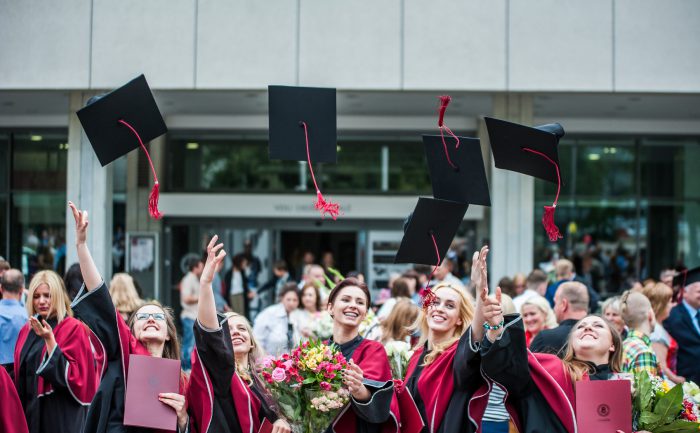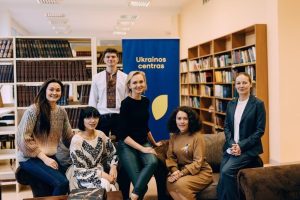VMU Receives High Evaluations from International Experts

In May, Vytautas Magnus University was visited by a team of international experts from the Centre for Quality Assessment in Higher Education (SKVC), who conducted an assessment of Vytautas Magnus University’s activities. VMU received high evaluations in all categories, securing accreditation for the maximum period of seven years. The experts recognised that the university stands out in Europe not only for the flexibility of its study programmes, but also for its wide-ranging international activities and high-quality research and infrastructure.
The experts gave VMU a rating “very good” in the categories of management, studies and research (art), and impact on regional and national development, and a rating “good” in the category of quality assurance.
According to the expert panel, VMU’s merger with Aleksandras Stulginskis University and Lithuanian University of Educational Sciences has resulted in significant improvements in effective management processes. Furthermore, the university’s strategic plan adequately reflects its mission and is based on a Strengths, Weaknesses, Opportunities, and Threats (SWOT) analysis. Being an active member of the European University Alliance “Transform4Europe”, VMU is successfully pursuing recognition as a university conducting international-level research. The university’s clear management structure has enabled it to respond effectively to unforeseen events, such as the pandemic and the war in Ukraine. The experts also highlighted VMU’s effective human resources management policy, which fosters a culture of participation and prioritises the well-being of the community, as well as the continuous improvement of infrastructure. Among the notable investments in a modern, high-standard university environment, VMU Sports Centre, library, Teacher Training Centre, and other facilities have been noted.
In the quality assurance category, VMU received a positive evaluation for its wide range of services for academic and non-academic staff and students. The assessment concludes that the university implements effective policies and procedures for quality assurance, based on national and international indicators and priorities. It also highlights VMU’s Code of Academic Ethics, which outlines provisions related to academic integrity, inclusion, equality, and diversity. Another example of good practice mentioned is the Centre of Ukraine established on VMU’s premises, which was visited by 24,000 Ukrainians over the past year.
In the area of academic and research (art) activities, the university received a highly positive evaluation, highlighting its success in fulfilling its mission to provide flexible, dynamic studies based on liberal arts traditions and allowing students to personalise their studies, thereby fostering versatile and rapidly adaptable graduates. Experts emphasise that this personalisation and flexibility with regard to studies is highly successful and distinguishes VMU not only in Lithuania but also in Europe. The conclusions also note that VMU offers excellent international opportunities for students, teachers, researchers, and staff, exemplified by its membership in Transform4Europe.
In a separate category, the SKVC international expert panel also assessed the university’s impact on regional and national development. Here, too, VMU was rated “very good”, noting in particular that the university works closely with various social partners in its studies and draws on their recommendations to propose new activities and improve study programmes. Examples of such good practices include the establishment of the VMU Centre of Ukraine and the organisation of the National Forum on Human Rights. It was also stressed that VMU offers extensive opportunities for lifelong learning that meet the needs of diverse learners.
The SKVC international expert panel not only conducted a comprehensive assessment of the university’s activities, but also offered recommendations on how VMU could further improve them. For example, it is advised to supplement the strategic plan for 2021–2027, taking into account the activities that have already been carried out and adopting a more focused formulation, reducing the number of indicators for the achievement of the University’s strategic objectives. They also suggest continuing to actively encourage staff participation in the activities offered by the Professional Competence Development Centre and analysing key indicators such as the number of drop-out students, staff turnover, etc.
The expert panel of the institutional review of Vytautas Magnus University was chaired by Prof. Philippe Dinkel, with Brenda Eade as the review secretary. The panel members included Prof. Dr. Daire Keogh, Dr. Peter Wells, Renata Guobužaitė, and Gaga Gvenetadze, and Kamilė Radzevičiūtė acted as the review coordinator at SKVC.
The external review of the Centre for Quality Assessment in Higher Education (SKVC) must take place at least every 5 years and the results of it must be made public. This is provided for in the Law on Higher Education and Research of the Republic of Lithuania (Article 22 (5)).














